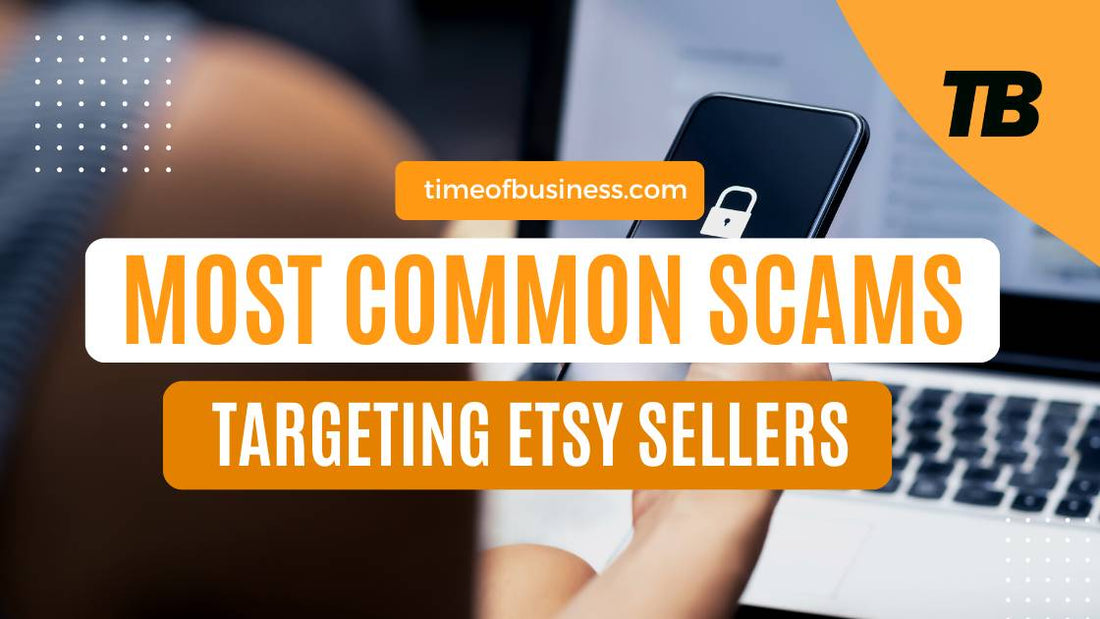In this article we're going to talk about getting scammed on Etsy as a seller. We'll show you some of the most common Etsy scams, and give you a few tips on how to avoid getting scammed. So if you're an Etsy seller, don't miss out on this quick read!

In recent months, a record number of messages in our Facebook groups for Etsy sellers have been about scam attempts. So we decided to write an article where we a) show you the most recent scam attempts on Etsy, and b) show you how to avoid getting scammed or how to try to recover from getting scammed as an Etsy seller.
Please note that our target audience in this post is Etsy sellers. For Etsy buyers that are afraid of getting scammed, we'll make a separate article soon.
The most common scams targeting Etsy sellers
These are some of the most common scam attempts used recently to target Etsy sellers and to gain access to their accounts:
1. Messages on Etsy from "customers" who want to buy a product, but need your email address
This is one of the most common scam attempts that more and more Etsy sellers are targeted by lately. New shops with no sales are the main target for these messages, because new sellers are more likely to believe that customers would actually need their email address to finalize a purchase.
WRONG! This is just a scam. Your customers on Etsy don't need your email address to buy an item in your shop. If you respond to these messages and provide your email address, you're just making the scammers' job easier, as they try to hack you.
Here are some examples. As you can see, the messages are often personalized, and they can also be in different languages:

A different variation in German:

And in Spanish:

We even have one that claims to be an "Etsy technical support agent" asking for the seller's email, on behalf of a customer:

2. Messages on Etsy from a fake "Etsy support" account asking you to verify your information

This is a more advanced scam attempt, where the scammer will try to get even more information from you, besides your email address.
As you can see in the print screen above, the seller received a message on Etsy from an account called "Etsy support". They are notified that they sold an item, but that Etsy "was unable to confirm their information for the sale".
So they start a process to verify their information. They can ask you a lot of questions as part of this process, starting with your email address, and continuing with personal information, bank account numbers, and so on.
Don't offer any personal or sensitive information via message on Etsy! Etsy support will NOT contact you through the message system. Especially not to ask you to provide sensitive information.
3. Emails that contain fake Etsy messages, asking you to confirm a sale
As you can see in the print screen below, there are many scam attempts via email as well. That is why you shouldn't share your email (see case no.1). Because scammers will use it to try even more hacking attempts.
So let's check out this print screen:

If you read it carefully, you can see that the phrasing is sloppy: "a user (...) has expressed buying your goods". So that is already an indication that the email is not legit.
Secondly, ALWAYS look at the sender address. Not only at the name, but also at the email address they are using. If it looks suspicious, don't click on anything they ask you to.
In this case, they ask the seller to press "confirm this deal". They used a button to conceal the link that you will follow when you click on it. And they used the Etsy aesthetic to make the email look even more legit. This is quite clever, and many people can fall for this if they're not paying attention.
How to avoid getting scammed as an Etsy seller
1. Never give sensitive information to anyone without being extra careful
Scammers will use any means to gain as much personal information about you as possible. They can contact you through the Etsy messaging system claiming to be a customer, they can send you emails if they already got hold of your email address, and even text messages, if they got hold of your phone number.
Whenever someone asks you for personal information, ask yourself this question: do they really need it? Does it make sense for Etsy/a customer to ask me this question?
For example, why would a customer need YOUR email address to place an order? It doesn't make sense.
Why would Etsy need your email address, your phone number, or your bank account info? You already give the platform all of the information they need when you create your Etsy seller account. They already have these details about you. They won't ask you to provide them again, especially not in order to confirm a sale.
2. If you already fell for a scam, do some damage control fast
Change your email address password and enable the two-factor identification. This way, if someone tries to access your email account, they'll also need access to your phone.
If you think your bank account is compromised, call your bank and ask them what steps you should take. If someone already took money out of your account, the bank may be able to reverse the transactions if you contact them. The sooner, the better.
3. Don't click on links that look suspicious
If you're ever unsure whether it's safe to click on a link, wait. Get advice from other people, if they have more experience with such things. Or even turn to our Facebook Etsy groups for support.
Most of these messages are created with some urgency ("click on this link to confirm the sale!" or "click on the button below to get the deal done"). The truth is, there's no rush. Take time to ponder things and don't hesitate to ask people you trust for help.
4. Look for errors in spelling or grammar or for phrases that look sloppy or unprofessional
Legit websites and marketplaces pay a lot of attention to the way they communicate. So their standardized emails, texts, and notifications will be written as correctly as possible.
Most scammers will make either a spelling or a grammar error somewhere. They might write a random word with a capital letter, or use a phrase that doesn't sound quite right. These are tiny indications that you are maybe not contacted by Etsy, but by someone trying to impersonate Etsy support.
Here are some examples from the cases above:
Random words in the middle of sentences written with capital letters:

Sloppy phrasing and strange sender title:

5. Share your experience, so that other Etsy sellers can learn from you!
Were you ever targeted by a scam? Share it in the comments, or in our Etsy sellers Facebook groups! What was the method the scammers used? By doing this, sellers can protect each others, and the Etsy sellers community can grow stronger.
Our Etsy Facebook groups:
Etsy Marketplace | Etsy Sellers and Buyers
Etsy Sellers Support Community!
6. Check out our YouTube video to learn more about scams & how to avoid them:
If you found this blog post & video useful, make sure to let us know in the comments. And don't forget to subscribe to our YouTube channel, so that we can keep creating free content for you!
Another useful 3-minute read: Discover with us 5 great ways to increase your Etsy holiday sales. Start implementing these tips as early as possible, to make sure you get the best results.

